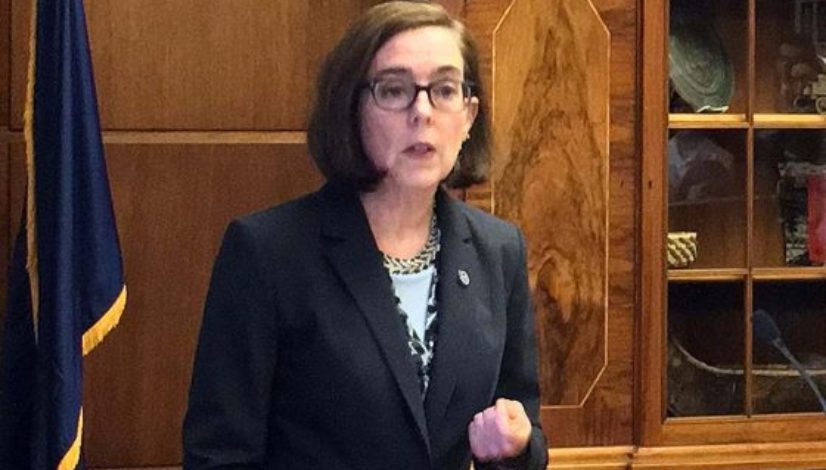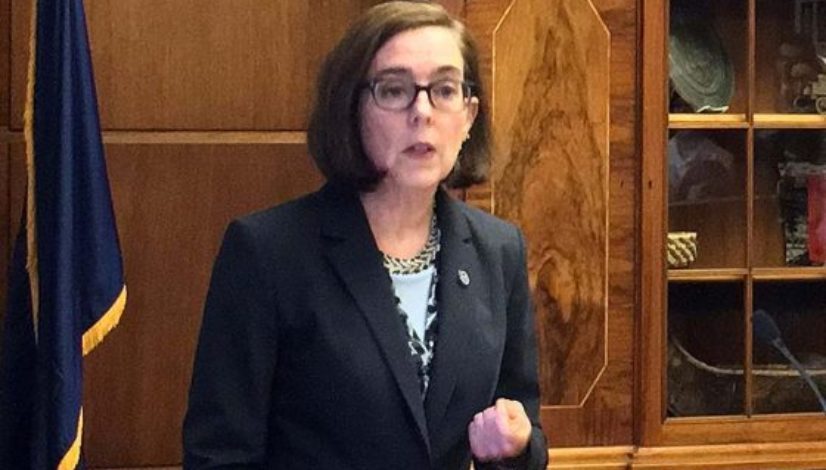Oregon gov, police chief say Sessions’ marijuana claims based on flawed, leaked, draft report

Published: Aug 23, 2017, 9:19 am • Updated: Aug 23, 2017, 5:25 pm
By Polly Washburn, The Cannabist Staff
Oregon’s governor and the head of the state police responded Tuesday to a letter from U.S. Attorney General Jeff Sessions, in which he said cannabis legalization in the state had not done enough to curb black market grows.
Like leaders from Washington and Alaska in letters last week, Gov. Kate Brown and Oregon State Police Superintendent Travis Hampton said that the data Sessions used to draw his conclusions came from a report that was inaccurate.
In her letter dated August 22, posted on the state’s website, Brown noted, “The Oregon State Police determined that the draft report required significant additional work and revision, because the data was inaccurate and the heavily extrapolated conclusions were incorrect.”
In his own letter of August 16, Hampton said the report, which Sessions’ cited and attributed to Hampton’s agency, was the “first and least defensible draft,” which the agency “had no immediate plans to publish until objective data could be recovered for many years.”
When the report was leaked, Hampton said, “The agency attempted to make clear the document was not accurate, not validated, outdated and the Oregon State Police did not endorse the conclusions in the draft baseline report. Unfortunately you sourced the same leaked draft document as evidence against Oregon’s marijuana regulatory structure.”
Governors of four Western states that have legalized recreational marijuana — Alaska, Colorado, Oregon and Washington — each received letters from Sessions dated July 24, responding to a joint letter the governors sent Sessions on April 3, asking Sessions and Treasury Secretary Steve Mnuchin to “engage with us before embarking on any changes to regulatory and enforcement systems.”
In each letter, Sessions referred to regional and state data depicting serious public health and safety issues arising from marijuana legalization.
In Oregon’s case, Sessions cited findings from an Oregon State Police report that noted “pervasive illicit cannabis cultivation in the state,” increases in emergency room visits and illegal trafficking.
Brown referenced recent legislation that she had signed into law from January to May of 2017, meant to address many of the issues raised by Sessions, including tracking technology, plant limitations, increased criminal penalties.
She also pointed to measures taken to ensure minors could not access “or even view” marijuana products, and a PSA campaign directed at minors.
Regarding testing, she mentioned “Oregon boasts the most robust testing regime of any state to legalize marijuana… to avoid exacerbation of any public health consequences associated with legalization.”
She warned that “dismantling of the Cole Memorandum would [drive] existing lawful product into the unregulated black market and [fund] criminal enterprise” but then closed her letter on a positive note:
I am confident that Oregon’s regulated marketplace, coupled with our enforcement work, will serve to ensure compliance with the Cole Memorandum. My staff looks forward to continuing its work with both the United States Attorney’s Office for the District of Oregon and your office in Washington DC to end black market marijuana operations and to provide mutual education and support of our legal and regulated marketplace.
Timeline
‘Something’s going to have to give’: An untenable conflict between feds, legalized states
Teaming up: Four governors urge feds to keep marijuana enforcement status quo
Fact-finding: Feds visit Colorado to research marijuana regulation, black market, enforcement
The AG replies: Sessions raises “serious questions” about Colorado and Washington’s marijuana management in letter to govs
The Sessions Letters: Read the U.S. attorney general’s missives to the first four states to legalize marijuana
Push back:Alaska and Washington govs question on Sessions’ marijuana enforcement letters
Alaska Gov. Bill Walker and his Attorney General Jahna Lindemuth responded in a letter dated Aug. 14 that the 2015 data cited by the attorney general could not “be fairly attributed” to the new marijuana regulatory system since legal sales in the state did not begin until 2016.
In their August 15 response to Sessions, Washington Gov. Jay Inlsee and Attorney General Bob Ferguson pushed back forcefully on the U.S. Attorney General’s citation of data from the March 2016 (NW HIDTA) report on marijuana in the state. They pointed out that the report was issued just four months before the state implemented legislative reforms that addressed many of the Depart of Justice’s (DOJ) concerns.
Colorado’s governor and attorney general have yet to respond, and one man thinks it’s “high time” they did..
Oregon Gov. Kate Brown response to U.S. Attorney General Jeff Sessions’ letter of July 25
Oregon Gov Kate Brown letter to Jeff Sessions (PDF)
Oregon Gov Kate Brown letter to Jeff Sessions (Text)
Oregon State Police Superintendent Travis Hampton’s letter supporting Brown’s statements
Travis Hampton letter to Jeff Sessions (PDF)
Travis Hampton letter to Jeff Sessions (Text)
Topics: black market, Jeff Sessions, Kate Brown, Oregon, regulation, Sessions and the states  Polly Washburn
Polly Washburn
Polly joined The Cannabist in December 2016 as a digital producer. She has been creating print, web and video content for a couple of decades. She returned to her home town of Denver in 2012 after living in eleven other cities in four countries, and…




